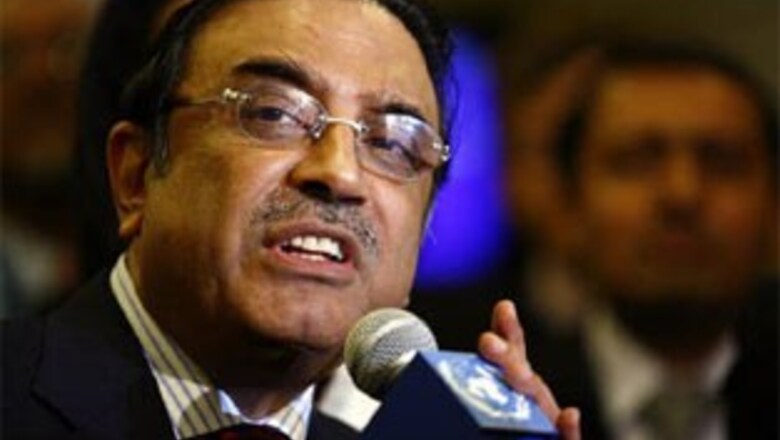
views
Islamabad: Rumours of a Pakistan coup sparked by a government minister being barred from leaving the country were dismissed on Friday after briefly causing flutters in financial markets.
Political tension has risen in Pakistan since the Supreme Court on Wednesday struck down an amnesty that protected President Asif Ali Zardari, several of his ministers and thousands of others from corruption charges.
Zardari can still not be prosecuted because he is protected by presidential immunity, but some opposition politicians have nevertheless called on him to step down. His spokesman said he wouldn't.
The prospect of political turmoil comes as the United States is stepping up calls on Pakistan to tackle Afghan Taliban in lawless border enclaves, where suspected U.S. drones on Thursday killed 12 fighters, Pakistani security agents said.
Rumours of a coup started, apparently, when Pakistan's ambassador to the United States, Husain Haqqani, told CNN in response to questioning about the defence minister being denied the right to leave that he hoped there would not be a coup.
A spokesman for the state anti-graft agency said on Thursday that after the amnesty had been lifted, the names of about 248 people had been placed on a list of people barred from leaving the country.
The spokesman did not identify any of those on the list but the president's spokesman, Farhatullah Babar, said Defence Minister Chaudhry Ahmed Mukhtar, was one of them.
"Of course there is no coup," said Babar, in Islamabad, where life was normal with no sign of any unusual activity in the chilly pre-dawn hours.
"The name of the defence minister happens to be on the list and he was not allowed to go," said Babar, adding he believed Mukhtar had been on his way to China late on Thursday when stopped.
The coup rumours swirled briefly in forex markets.
The euro hit its lowest since March against the Swiss franc, often considered a safe-haven currency, and the yen surged against the dollar, euro and higher yielding Australian dollar as thin liquidity set a chain reaction in motion.
The currencies later recovered the worst of their losses.
Resignation calls
The military, which has ruled Pakistan for more than half of its 62-year history, last staged a coup in 1999.
Army chief General Ashfaq Kayani has vowed to stay out of politics but analysts say the military could intervene in the event of a serious crisis.
Mukhtar was not immediately available for comment but Babar said the minister had dismissed the accusations against him.
Interior Minister Rehman Malik is also on the list of people who were protected by the 2007 amnesty which the Supreme Court said was unconstitutional.
The ministers are also facing calls to resign. Their departure from government would not have a significant impact on Pakistan's war on militancy which is led by the army.
Some legal experts say the danger for the president is that the legitimacy of his 2008 election as president could be challenged now that old cases against him have been revived.
The amnesty was introduced by former president Pervez Musharraf as part of a power-sharing deal brokered with Bhutto with U.S. and British encouragement.
Bhutto returned to Pakistan from self-imposed exile soon after the amnesty was introduced, but she was assassinated weeks later while campaigning for a general election she hoped to win.
Instead, Zardari led her party to victory in the February 2008 polls and became president after Musharraf stepped down later that year.
His image, however, has long been tarnished by allegedly shady deals during Bhutto's terms as prime minister when Zardari also served as a minister.
He says the charges were politically motivated. He has never been convicted but nevertheless spent 11 years in jail.




















Comments
0 comment